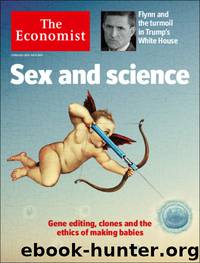The Economist_20170218 by The Economist

Author:The Economist
Language: eng
Format: mobi
Tags: Magazines
Publisher: The Economist
Published: 2017-02-16T22:48:43.624254+00:00
文章 章節 下一項
上一項 文章 章節 下一項
A do-over in Moldova
How Moldova escaped the effects of a giant banking crisis
A leaked report revealed that in 2014 up to $1bn, equivalent to more than one-eighth of the country’s GDP, had been stolen from three banks
Feb 18th 2017 | CHISINAU
At least the wine is safe
MOLDOVA is a country of ignominious records. It is by far Europe’s poorest place. Among countries that bother to count foreign tourists, only Tuvalu welcomes fewer. To these dubious achievements, this little Romanian-speaking former Soviet republic added a new one in 2014. A leaked report revealed that up to $1bn, equivalent to more than an eighth of the country’s GDP, had been stolen from three banks. Relative to the size of its economy, that may be the biggest bank fraud of all time. What happened next, however, was surprising.
Following the theft economists had feared the worst, especially since two of Moldova’s biggest trading partners, Ukraine and Russia, were mired in financial crises of their own. Yet since then the country has coped remarkably well. GDP shrank by a mere 0.5% in 2015 (whereas Russia’s fell by 4% and Ukraine’s tanked by 10%). Last year Moldova grew by 2%, fast by European standards.
Some credit must go to the government, which swiftly offered a blanket guarantee of deposits. The state in effect issued debt to cover every deposit in banks that failed. Moldova’s government finances look a little shakier as a result. But neither households nor companies have lost money directly. The government’s intervention has thus propped up consumption and investment. The tills at MallDova, a shopping mall in the capital, are still ringing.
The odd structure of the Moldovan economy also helped. It is heavily agricultural: about a third of workers are farmers. Most are smallholders. Few borrow much from banks, so few have noticed that credit has grown tighter. Good weather played a part: following dry conditions in 2015 cereal production rose by a third last year. A free-trade agreement with the EU in 2014 provides a ready market for Moldovan commodities, including its delicious wine.
Money sent back by Moldovan emigrants may have also softened the blow. Moldova is about twice as dependent on remittances as the Philippines, which is saying something. Though the flow has slowed, the weakness of the Moldovan leu ensures that expats sending money from the EU get a good deal.
Problems remain. Even the poshest areas of Chisinau have pockmarked roads and poor lighting. Corruption is rampant (though the IMF is helping the government to fight it), 15% of Moldovans are poor and higher government debt means fiscal policy will be tight. But for a place that usually makes the news for the wrong reasons, a glimmer of hope is about as good as it gets.
This article appeared in the Europe section of the print edition under the headline “A do-over in Moldova”
Download
This site does not store any files on its server. We only index and link to content provided by other sites. Please contact the content providers to delete copyright contents if any and email us, we'll remove relevant links or contents immediately.
International Integration of the Brazilian Economy by Elias C. Grivoyannis(110027)
The Radium Girls by Kate Moore(12018)
Turbulence by E. J. Noyes(8040)
Nudge - Improving Decisions about Health, Wealth, and Happiness by Thaler Sunstein(7692)
The Black Swan by Nassim Nicholas Taleb(7106)
Rich Dad Poor Dad by Robert T. Kiyosaki(6608)
Pioneering Portfolio Management by David F. Swensen(6288)
Man-made Catastrophes and Risk Information Concealment by Dmitry Chernov & Didier Sornette(6005)
Zero to One by Peter Thiel(5786)
Secrecy World by Jake Bernstein(4741)
Millionaire: The Philanderer, Gambler, and Duelist Who Invented Modern Finance by Janet Gleeson(4465)
The Age of Surveillance Capitalism by Shoshana Zuboff(4275)
Skin in the Game by Nassim Nicholas Taleb(4237)
The Money Culture by Michael Lewis(4198)
Bullshit Jobs by David Graeber(4179)
Skin in the Game: Hidden Asymmetries in Daily Life by Nassim Nicholas Taleb(3989)
The Dhandho Investor by Mohnish Pabrai(3758)
The Wisdom of Finance by Mihir Desai(3733)
Blockchain Basics by Daniel Drescher(3574)
